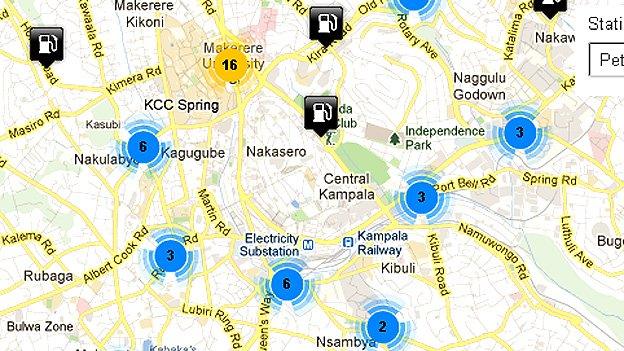Kenya's battle to switch off fake phones
- Published
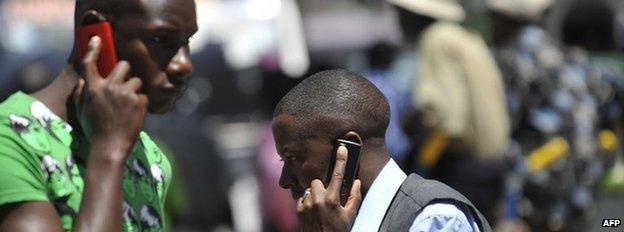
Peter Marete, a second-hand clothes dealer in Kenya's capital, Nairobi, is finding life very difficult without a mobile phone.
"My clients are unable to reach me - my business is being affected," he tells the BBC.
His phone was switched off on Monday by his mobile phone operator because his handset's IMEI number - the unique identifier for each phone - was not recognised by an international database and was therefore deemed to be "fake".
About 1.5 million Kenyans have been affected by the switch-off launched this week by the Communications Commission of Kenya (CCK) to clamp down on counterfeit handsets, defined as "copies of popular brands and models made from sub-standard materials" that have not been licensed by the organisation.
They are sourced from China and other parts of Asia, as well as Nigeria and South Africa.
The CCK says the move is to protect consumers from substandard phones, safeguard mobile payment systems and prevent crime.
"They've become a menace to consumers from both the safety and security perspective," CCK head Francis Wangusi told the BBC.
"The fake mobile phones have been used frequently in trying to perpetuate criminal activities.
"It has been very difficult for the security agencies to trace these culprits."
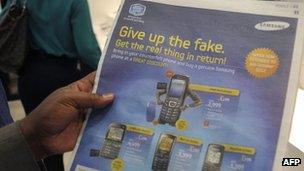
Retailers have advertised for customers to exchange a fake phone for a new one at a reduced fee
Anger
During a big publicity campaign in the run-up to the deadline, all mobile phone subscribers were encouraged to check the status of their handsets by texting their IMEI number to a special number set up by the CCK which then let them know whether or not their phone was genuine.
But some people are angry and say the process has been flawed.
Nairobi music seller Simon Gitau was frustrated to find his phone unresponsive on Monday morning - unable to make or receive calls or even receive text messages from his customers and friends.
He bought his Nokia E63 from a mobile shop along in central Nairobi three years ago.
He had no doubt it was genuine and spent $300 (£185) on the handset.
For all this time the music seller has been using the mobile to carry on his business.
"On Sunday, I had received a message from CCK informing me that my phone was genuine and registered, and I had no cause no worry," the father of two said.
"But I was so shocked when suddenly my phone went off. I went to CCK offices where I was told it was among the fake phones that had been switched off.
"It is really bad because I cannot be able to reach my customers now and I am forced to communicate with them through Facebook and Twitter so that I don't lose out on business. This is really bad."
In response to such complaints, the CCK insists no genuine mobile handsets have been switched off - and any such complainants should get in contact.
The SMS message Mr Gitau received may have been a technical error, but the phone would have only been turned off if was fake, the CCK said.
There have also been reports that those who find their phones cut off have simply switched to a different operator.
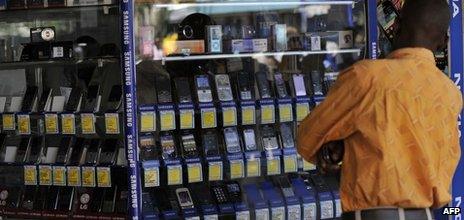
Simple handsets to the latest smartphones are available in Nairobi
But the CCK says this will prove fruitless. The counterfeit switch-off is set to take a week - at the end of which an audit will be made - and those hoping to find a loop hole will fail.
Kenya has 29 million mobile phone subscribers - and competition between the country's four operators is fierce.
However, Mr Wangusi says all the mobile operators agreed to comply with the government directive to implement the shutdown, signing a joint memorandum of understanding in which the CCK agrees to financial compensation for losses incurred.
As members of the GSMA - the association representing mobile phone operators worldwide - the operators have access to its IMEI Database, enabling them to check the authenticity of devices - and create a blacklist of their subscribers with counterfeit phones.
Their customers' SIM cards, which also must be registered, will continue to work in a genuine handset.
The permanent secretary in the communication ministry Bitange Ndemo says the government also intends to switch off phones with unregistered SIM cards, but the focus at the moment is the the counterfeit phone switch-off.
Tax evasion
Mobile phone retailer Janet Munene told the BBC that her sales had sharply dropped because of the shutdown.
"On an average good business day, I would have sold about 20 handsets by now," she said.
"But look, it is midday and no single customer has walked into my shop.
"I think most customers are reluctant to buy mobile handsets because they are suspicious about their validity."
For Ms Munene, it is the Kenyan authorities who should shoulder responsibility for the flood of counterfeit phones on the market.
"The blame squarely lies with the government for allowing the importation of fake mobile handsets.
"What was the Kenya Bureau of Standards doing when these handsets found their way to the Kenyan market? They have the single responsibility to ensure that all goods entering the country are of high quality."
Kenya has strong anti-counterfeit laws with all the necessary provisions to deal with those selling fake goods.
Yet the country's economy remains a big dumping ground for counterfeits including music, computer software and even foodstuffs.
Counterfeit handsets are said to cost Kenya's economy millions of shillings in evaded taxes each year.
The big shutdown is also likely to impact negatively on the millions of Kenyans who rely on Mpesa mobile phone money transfers.
Many people use Mpesa for quick financial transactions both locally and internationally.
Mr Marete says he is now looking for money to purchase another handset, which could cost him about $20 for a simple handset and up to $1,000 for the latest smartphone.
But according to the CCK, once he does get one, he should enjoy a better service as fake phones degrade the networks and often cut calls mid-conversation.
- Published26 September 2012
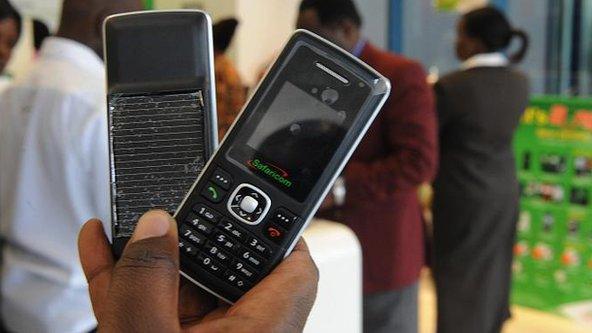
- Published9 November 2011
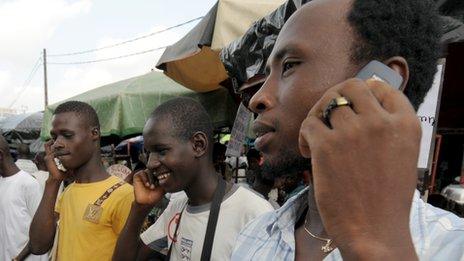
- Published17 July 2012
